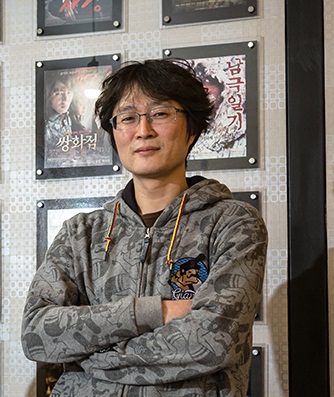KWAK Tae-yong is the co-founder and co-president of Technical Art Studio Cell, which specializes in special effects makeup, special props and animatronics. KWAK started his career as part of a special effects makeup company in the early 2000s, and then established Cell in 2003 with HWANG Hyo-kyun. Since then, Cell has grown to become the most experienced studio in the field in Korea. Starting with PARK Chan-wook’s segment in <Three… Extremes> (2004), they have contr...
More
KWAK Tae-yong is the co-founder and co-president of Technical Art Studio Cell, which specializes in special effects makeup, special props and animatronics. KWAK started his career as part of a special effects makeup company in the early 2000s, and then established Cell in 2003 with HWANG Hyo-kyun. Since then, Cell has grown to become the most experienced studio in the field in Korea. Starting with PARK Chan-wook’s segment in <Three… Extremes> (2004), they have contributed to more than 220 films, including KIM Jee-woon’s <Bittersweet Life> (2005) and <I Saw the Devil> (2010), PARK Chan-wook’s <I’m a Cyborg but That’s OK> (2006) and <Thirst> (2009), and BONG Joon-ho’s <The Host> (2006) and <Mother> (2009). KWAK and HWANG have always worked closely together, establishing a company famous for its proficiency in creating realistic dummies. However, KWAK is more interested in animatronics; he has notably showcased his talent in this with the enlightened android in “The Heavenly Creature”, a segment in anthology <Doomsday Book> (2011), or the namesake beast in <The Tiger> (2015), making good use of 3D printing technology. The company has also been active abroad, with the Taiwanese war epic <Warriors of the Rainbow: Seediq Bale> (2011) by Wei Te-Sheng and the Chinese historical fantasy <Young Detective Dee: Rise of the Sea Dragon> (2013) by Tsui Hark. He and his partner HWANG Hyo-gyun received in 2016 the Technical Achievement Awards from the Blue Dragon Film Awards and the Korean Association of Film Critics for their work on the zombie action movie <TRAIN TO BUSAN> (2016).
Less






